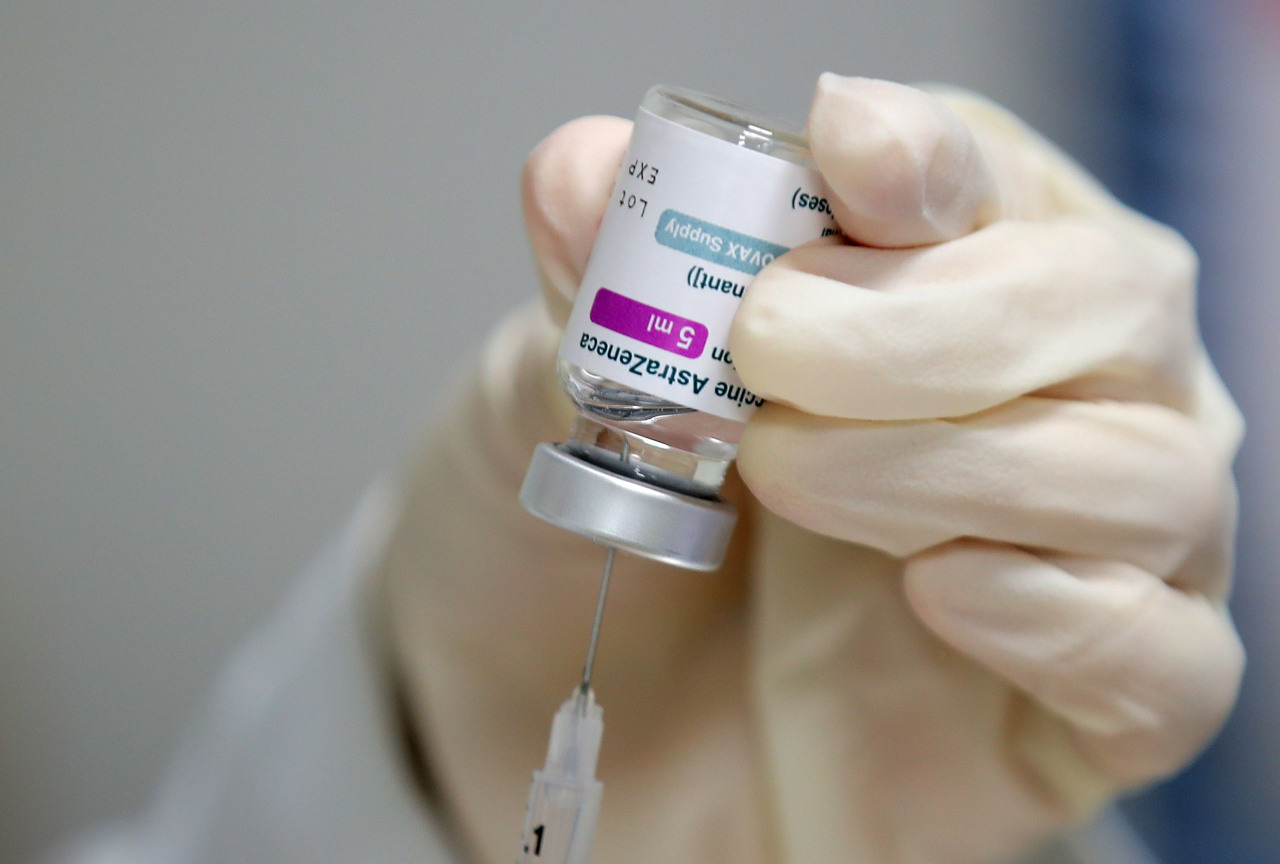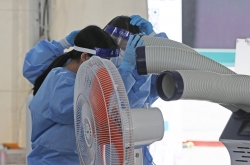South Korea does not have test kits to diagnose a form of blood clot that is now listed as a rare side effect of AstraZeneca’s COVID-19 vaccine, sources in the health care sector told The Korea Herald.
Health officials said in recent government briefings that the country has yet to confirm any cases of the post-vaccination blood-clotting syndrome termed thrombosis with thrombocytopenia syndrome, or TTS.
But Korea is still waiting for an immunological test that is used in a TTS diagnosis to be imported into the country, according to a laboratory medicine specialist at a major hospital. The hospital is among the few institutions designated by the government to run these tests.
A TTS diagnosis is confirmed if a patient tests positive for antibodies to the platelet factor 4, or PF4, the source said in a phone interview Wednesday evening.
“There are two main ways of conducting the tests for PF4 antibody, through the manual ELISA kit and through the automated assay,” he said. “The latter is found to be erroneous and lacking in accuracy for TTS patients, which is why the former is recommended internationally.”
But only the latter, non-ELISA test is available in Korea currently, meaning there is “no way of testing people for TTS at the moment,” he said.
In the absence of the diagnostic test, doctors should still be able to screen for potential TTS cases based on blood results such as a low platelet count and elevated D-dimer levels, he added.
From the information that has been relayed to him by the KDCA, he said he did not expect the blood clot cases identified among AstraZeneca vaccine recipients so far to test positive when the test kits become available. The KDCA said no known cases the “clinical characteristics” of TTS.
He said the batch of test kits coming into the country later this month or possibly next was expected to be enough for 100 to 200 people -- which he said “should be sufficient.” “I don’t suppose we are going to be seeing that many suspected cases,” he said. “Again, the incidence of these events is highly rare.”
Another blood specialist at the Korean Society on Thrombosis and Hemostasis said the laboratory testing for TTS was in the process of being set up at a number of hospitals around the country.
“From what I’ve heard it should be ready around May 30 at select hospitals. When health officials receive reports of patients with suspected cases, their samples will be sent there for testing,” he said.
In a phone call with The Korea Herald, a senior KDCA official confirmed Thursday that the PF4 ELISA tests will be brought into the country in June.
But in previous announcements, the KDCA said a first responder in his 20s diagnosed with cerebral venous sinus thrombosis, or blood-clotting in the brain, had tested negative for PF4 antibodies. Asked to explain, the official said the first responder was given a non-ELISA test, which is “different from the one that is recommended.”
The official added, “But so far none of the people who developed blood clots after AstraZeneca vaccination in Korea showed TTS-like characteristics, which means that a test would not have been necessary.”
There were several others who were found to have blood clots following AstraZeneca vaccinations, including two women in their 20s that came down with pulmonary embolism or blockage in the lung arteries. They were not tested as they did not closely match the descriptions of TTS, he said.
It is unknown how many vaccinated people in Korea have suffered blood clots. The KDCA official said in an earlier phone call with The Korea Herald that the agency was not keeping a tally of blood clot cases detected among people who received COVID-19 vaccines as they did not exhibit signs typically associated with TTS.
Dr. Paik Soon-young, a virologist at the Catholic University of Korea, said that a prompt diagnosis was “paramount” with TTS as the condition could be fatal if treated wrongly. As the rollout of the AstraZeneca vaccine is extended to younger people in their 30s to 50s, who are known to be more prone to the side effect, having the test ready was “essential,” he said.
Dr. Kim Dong-wook, a hematologist at St. Mary’s Hospital, said patients with suspected TTS should be hospitalized and monitored closely.
“The typical features are blood clots in combination with reduced platelets, but in early stages of TTS, a patient could present normal platelet levels,” he said. “If a case can be confirmed through PF4 ELISA results then that would be optimal.”
By Kim Arin (
arin@heraldcorp.com)

![[Newsmaker] Korea has no cases of COVID-19 vaccine-induced blood clot: KDCA](http://res.heraldm.com/phpwas/restmb_idxmake.php?idx=605&simg=/content/image/2021/05/18/20210518000807_0.jpg)

![[News Focus] Action plan to make Korea a global COVID-19 vaccine factory takes shape](http://res.heraldm.com/phpwas/restmb_idxmake.php?idx=605&simg=/content/image/2021/05/19/20210519000199_0.jpg)







